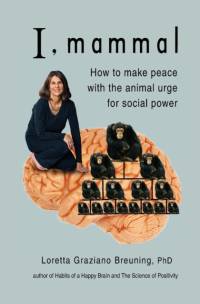Om I, Mammal
Do you feel like people are putting you down?
The frustration can ruin an otherwise good life. It feels real until you know how the mammal brain works. Animals seek the one-up position to get more food and mating opportunity. Natural selection built a brain that seeks the one-up position as if your life depends on it. You seek it too. This book shows you how to make peace with this frustrating impulse.
SEROTONIN AND SOCIAL POWER
The mammal brain rewards you with the good feeling of serotonin when you gain a position of strength. But the serotonin is soon metabolized and you have to do more to get more. This is why people are so busy seeking social power.
Serotonin is not aggression. It's the calm pleasure of knowing you can meet your needs. Imagine a chimpanzee who dominates its group mates. The chimp may share bananas, but everyone know who's in charge.
We don't intend to think this way, but our neurochemicals are controlled by brain structures inherited from earlier mammals. When you understand the social rivalry of the animal world, you can navigate the social rivalry in your world. This book shows you how:
you got wired to seek social power in ways you got it in youth
your threat chemicals are triggered by the one-down position
"junk status" lures you with fast serotonin boosts
you can rewire your brain to enjoy serotonin without junk status
Our appetite for social power is as natural as our appetite for food and sex. In fact, social comparison is more primal that food and sex because an animal always compares its strength to others before reaching for a reward.
It's not easy being mammal!
You may say you're for "equality," but if you filled a room with people who said that, a status hierarchy would soon form based on how hard each person insists. That's what mammals do! If you're upset about this all the time, you will ruin your life. You can learn to accept yourself and others. You can enjoy life as a mammal among mammals.
n the human world, we give this primal impulse many names: pride, ego, self-confidence, assertiveness, competitiveness, arrogance, one-upping, status, power, importance, dominance, manipulativeness, being special, as well as getting respect, approval, or attention. We see it critically when others seek social power, but when we seek it ourselves, or our herd-mates seek it, we think we're just trying to survive.
The mammal brain cannot process language so it can't tell your verbal brain why it feels this way. Your mammal brain and your verbal brain are literally not on speaking terms. When you understand the mammal brain, you can find your power over your serotonin.
The point is not that we should seek social power. The point is that we do, and we suffer over minutia as a result. You can learn to stimulate your serotonin without being a jerk. But you have to get real about your impulses to do that.
Mammals live in groups for protection from predators, but group life is frustrating. You see others get better mating opportunity and foraging spots. It feels like a threat to your survival, which triggers cortisol (the stress chemical).
Your brain strives urgently to relieve cortisol and stimulate serotonin. It loves whatever works. "Junk status" works. You may find yourself addicted to habits that boost your social power in the short run but harm you in the long run. This book helps free you from such addictions.
Visa mer

